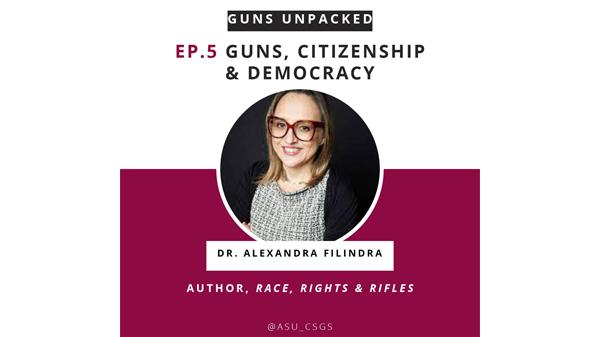Join Guns Unpacked with Dr. Alexandra Filindra on Guns, Citizenship and Democracy

On November 1, join us at Guns Unpacked as we talk to Dr. Alexandra Filindra, an associate professor of political science and psychology at the University of Illinois in Chicago, about her 2023 book Race, Rights, and Rifles: The Origins of the NRA and Contemporary Gun Culture, from the University of Chicago Press.
Dr. Filindra's journey into studying gun politics began after the Sandy Hook Elementary shooting. She was surprised by the lack of political science literature on the link between race, mass shootings, and broader gun culture. Her research uncovers the deep historical roots that intertwine guns, citizenship, and race in American political discourse.
"What I tried to understand was: Where does this obsession with guns as a political right [come from]? The idea that guns are related to good citizenship?"
To get at these deep roots, her book examines ascriptive martial republicanism, an ideological framework for citizenship. As she examines in her book, after the Revolutionary War, the Uniform Militia Act of 1792 mandated that white men supply firearms and participate in militias, which worked to link military service with eligibility for political rights. As a means of extending citizenship to white men, ascriptive martial republicanism offered a way to reconcile the contradiction between democratic ideals and slavery and reinforce white male supremacy in the process. Through quantitative and qualitative analysis, Dr. Filindra examines how this ideology continues to shape sentiment surrounding guns today, particularly among white Americans.
"We have created an ideology now where we are saying...buying firearms and promoting gun rights, and believing in gun rights...gives you the right to make decisions about what's good and what's bad in politics."
Contrasting ascriptive martial republicanism, Filindra also discusses inclusive civic republicanism, which is grounded in multiculturalism, civic participation, and non-violent conflict resolution. This ideology, embraced by more than 70% of white Americans, rejects militarized policies and authoritarianism. Yet, Dr. Filindra worries about the trajectory of gun violence and, after the recent Supreme Court decisions regarding Second Amendment rights, the ability of lawmakers to develop policies that can address the kinds of tragedies—like Sandy Hook—that drove her to study guns in the first place. As such, Dr. Filindra argues that the central question moving forward about the role of guns in political life relates to who gets to decide what constitutes democracy—versus tyranny. Listen in as she makes the case for more scholarship that critically examines how the right to bear arms intersects with democracy and political stability.